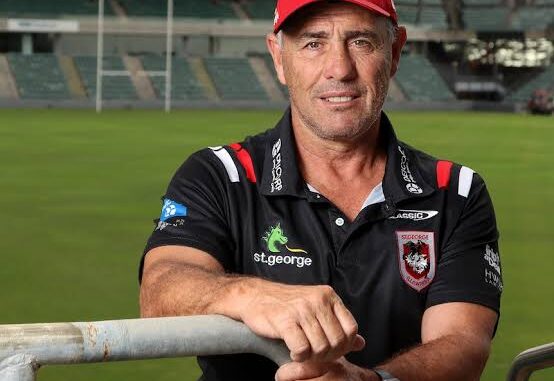
St. George Illawarra Dragons coach Shane Flanagan has faced a tumultuous season, marked by persistent performance issues, leading to his unexpected dismissal from the club. Appointed to rebuild the Dragons and bring a competitive edge back to the club, Flanagan’s tenure has been cut short due to disappointing results and an inability to meet expectations both on and off the field. The decision to part ways with him highlights the Dragons’ ambition to overhaul their approach and reignite their journey toward success in the NRL.
Shane Flanagan, a veteran coach with an impressive resume, was brought on to restore stability to the Dragons and lead them to contention. Flanagan previously served as head coach of the Cronulla Sharks, where he won a historic NRL premiership in 2016. Known for his strategic approach and ability to inspire, Flanagan was seen as a promising candidate to lead the Dragons out of a difficult period marked by instability and inconsistent performance.
Upon his appointment, fans and management alike hoped that Flanagan’s experience would bring new tactics, resilience, and a winning mentality to the team. The club had struggled to find a rhythm, often finishing mid to lower on the league table. With his experience, Flanagan was expected to turn around a squad that had shown glimpses of potential but had failed to achieve meaningful consistency. However, the outcome of his stint at the Dragons did not reflect the initial optimism.
Flanagan’s tenure with the Dragons faced challenges from the outset. Despite some high-profile signings and strategic adjustments, the team struggled to find form, often succumbing to weak defense and a lack of cohesion in attack. Key players, including the halves pairing of Ben Hunt and Kyle Flanagan, experienced difficulties in establishing synergy, leaving the team exposed during critical phases of matches. The team’s offensive strategies seemed disjointed, and defensive errors became increasingly frequent, leading to mounting losses.
As the season progressed, the Dragons’ performance issues became more apparent. Their inability to maintain possession, combined with inconsistent efforts from the forwards, left gaps in defense that opponents exploited regularly. One of the most telling games came during their local derby against the Sharks, where they were soundly beaten. Similarly, losses against teams at the bottom of the ladder further compounded the frustration, as fans began questioning Flanagan’s tactics and his ability to motivate the squad.
With each loss, scrutiny on Flanagan grew, and the pressure to deliver increased. Dragons’ management was clear that the team’s trajectory needed to shift, as there were concerns over Flanagan’s ability to make meaningful adjustments to halt the downward slide. As the Dragons fell further behind in the standings, murmurs of a potential coaching change grew louder, with some fans and analysts expressing doubts about whether Flanagan was the right fit for the club’s long-term ambitions.
Ultimately, after a series of particularly demoralizing performances, the Dragons decided to terminate Flanagan’s contract. The decision was driven by a desire for fresh leadership, hoping to rejuvenate the club’s culture and establish a more consistent, resilient approach on the field. With fan dissatisfaction and financial implications weighing on the club’s operations, management felt that moving forward with a new head coach was the best option.
The Dragons now find themselves at a crossroads, facing a critical period of rebuilding as they search for a new head coach. With an eye toward the future, the club’s management will likely prioritize a candidate capable of inspiring and developing young talent, enhancing tactical discipline, and fostering a culture of accountability within the squad. Additionally, restructuring the team’s core, potentially seeking new leadership roles within the player ranks, and reinvesting in promising players will be crucial.
Several high-profile coaches are already being considered as potential successors to Flanagan, including assistants and former head coaches with experience in reinvigorating struggling teams. Management is expected to conduct a thorough search, aiming to bring in someone capable of delivering sustained improvement and aligning with the club’s long-term goals.
While Flanagan’s tenure at the Dragons may not have produced the results fans and the club had hoped for, his impact will serve as a reminder of the challenges in bringing stability to a team in transition. His departure underscores the importance of adaptability and resilience, both from a coaching and managerial perspective, as clubs strive for success in the competitive landscape of the NRL.
In summary, Shane Flanagan’s departure marks a significant turning point for the St. George Illawarra Dragons. With a new leadership search underway, the club hopes to embark on a new chapter, reinvigorated with the spirit and drive to compete at the highest level. While Flanagan’s time at the helm has come to an end, his legacy will influence the Dragons’ next steps as they aim to restore their place among the league’s top contenders.
Leave a Reply